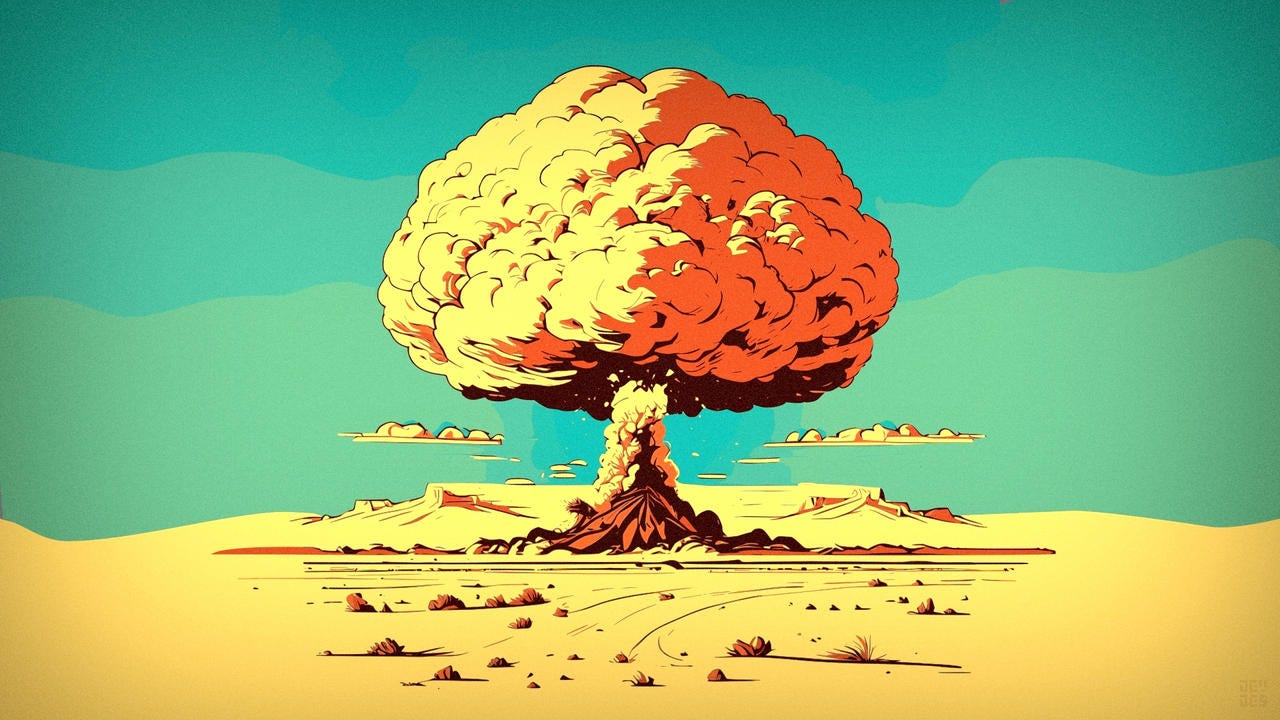A-Bomb Morality Arguments Aren't Helpful
Spiritual fights over the past don't help us understand history.
“Should Truman have dropped the atomic bomb?” is not a historical question.
It’s provocative and quite engaging, but ultimately metaphysical. What we really mean is: was Truman’s order morally right?
Interestingly, many Western people today are ill equipped to argue this because they don’t agree on or even believe in morality—much less an absolute morality that could arbitrate the use of atomic weapons eighty decades ago. They do it anyway, of course, with increasing gusto. None of it helps us to understand history better.
My 9th grade students love to debate the A-bomb drop as we examine sources from Stanford History’s tremendously rich (and free) teacher playbook. These include excerpts from American history textbooks, memos from Truman’s advisors, battle-fatigued U.S. soldier opinions, haunting survivor accounts from Hiroshima, and bracing body count graphs. I constantly have to steer my kids away from “Was this the right decision?” to the historical question: “Which modern narrative do the sources support: A-bomb as American triumph or Japanese victimization?”
The answer, like much of history, is both.
An atomic weapon can evaporate a city while at the same time preventing the deaths of American and Japanese soldiers, as well as Japanese civilians ordered to fight to defend their home to the last man, woman, and child. Those competing truths do not make the impact of atomic weaponry less horrific. Neither do they blunt the fact that Japan’s Ketsu Go plan ordered Japanese civilians to fight until annihilation—a practice the Imperial Japanese Army had followed the entire war.
We argue endlessly about the A-bomb drop because we’re blurring religion and history. We desperately want moral clarity, but history doesn’t offer that. Our modern political obsession with being “on the right side of history” (which is a modern religion) dulls our historical reasoning. We act the priest while claiming to be the professor, seizing both puritanical high ground and historical narrative in one glorious uphill charge. Who, we ask, could challenge us from these heights?
Facts have an annoying habit of clarifying moral arguments. For example, from 1937-1945 the Japanese military machine killed between 3 and 10 million people, perhaps as many as 6 million Chinese.1 Widening to 1931-1945 inflates that number to heights so high they are difficult to calculate.2 Atrocities pile up: mass rape at Nanjing, human experiments at Unit 731, mass murder at POW camps, the Bataan Death March, and cannibalism (after torture) of U.S. pilots (that strangely almost killed a future American president). Consider the devastating irony of John Rabe, a Nazi foreign national living in Nanjing, who routinely risked his life to save Chinese civilians from the endless sadism of Japanese soldiers.3
So we find ourselves stuck. If a murderous weapon (the A-bomb) stopped the actions of a far more murderous regime (the Japanese military), can any argument be made that dropping it was “wrong”? Because innocent civilians suffered horrible fates? Go peddle that to one of the 10,000 Korean women forced into prostitution for the “comfort” of Japanese soldiers. I dare you.
I am not suggesting we shouldn’t debate the atomic bomb’s morality, but that we should separate it from historical inquiry. Primary sources support each modern narrative: the A-bomb was both a triumph and a tragedy—for both Japanese, Americans, and millions of peoples across Asia. That doesn’t make it “right” or “wrong” - it just makes it history.
Drilling down into the sources—comparing, corroborating, and contextualizing them—frees us from taking the role of judge and jury. “Why did they do this?” is more honest to the past and more helpful for the future than “Was it right?” Historians who play God quickly find themselves damned by their own standards.
Truman didn’t gloat or blush: “It was a terrible decision. But I made it.”4 Adopting the same sober judgement as we explore history would help us better understand the people and decisions we so often find ourselves judging.
https://www.hawaii.edu/powerkills/SOD.CHAP3.HTM
https://www.sciencespo.fr/mass-violence-war-massacre-resistance/en/document/japanese-mass-violence-and-its-victims-fifteen-years-war-1931-45.html
https://www.theatlantic.com/international/archive/2012/01/the-nazi-leader-who-in-1937-became-the-oskar-schindler-of-china/251525/
https://apjjf.org/-Peter-J.-Kuznick/2479/article.html


